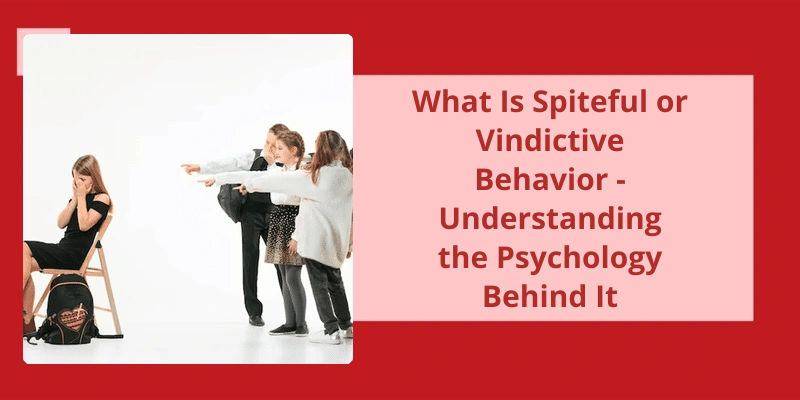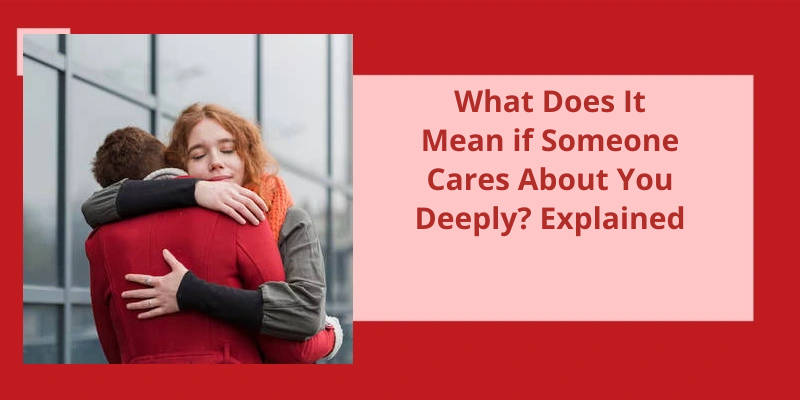Vindictive behavior is a type of negative and destructive conduct that’s aimed at causing harm to another person or group of people. It’s characterized by an unhealthy desire for vengeance or revenge, which often stems from feelings of anger, frustration, or resentment. Such behavior can take many different forms, from verbal aggression and manipulation to overt acts of aggression or violence. The motivations behind vindictive behavior can vary widely, but may include feelings of betrayal, jealousy, or the desire to regain power or control in a particular situation. Ultimately, such behavior can be highly destructive, not only to the intended target but also to those around them, and can have long-lasting negative consequences for all involved.
What Does Spiteful and Vindictive Mean?
Spiteful is an adjective used to describe someone who’s full of spite, malice, or ill will towards others. It’s when someone has a strong desire to hurt or offend someone else for no apparent reason. Spiteful behavior may be motivated by anger, jealousy, resentment, or envy. Spiteful people may choose to hurt others in different ways, including spreading rumors, talking behind someones back, or even sabotaging their work.
Vindictive is another adjective that’s often used interchangeably with spiteful. It describes someone who’s a strong desire to seek revenge or pay back someone who’s wronged them. Vindictive people may hold grudges or harbor deep-seated resentments against others. They may go to great lengths to get even with those who they perceive have wronged them, even if it means breaking the law or causing harm to others.
Revengeful is yet another word that’s similar in meaning to both spiteful and vindictive. Revengeful people are often fueled by anger, resentment, or a sense of injustice. They may take actions that aren’t rational or just in order to get back at the person who wronged them.
Overall, spiteful, vindictive, and revengeful behavior are all negative traits that can lead to conflict and hurtful situations. While it’s normal to feel angry or upset at times, it’s important to find healthy ways to cope with those emotions instead of acting out in spite towards others. Learning to forgive and letting go of grudges can also go a long way in promoting peace and harmony in our relationships.
Examples of Spiteful or Vindictive Behavior in Different Contexts (Work, Relationships, Online, Etc.)
This topic explores instances of malicious and retaliatory actions demonstrated by individuals in various settings such as work, relationships, and online interactions.
Understanding personality disorders can be complex, and there are many different types with distinct symptoms. However, one trait commonly associated with some disorders is vindictiveness. This behavior can range from mild to extreme and is sometimes seen in individuals with narcissistic personality disorder, which can lead to narcissistic rage. Let’s take a closer look at what this means and how it might affect those with this disorder.
What Personality Disorder Is Vindictive?
Narcissistic personality disorder (NPD) is a mental health condition characterized by an inflated sense of self-importance, a need for admiration, and a lack of empathy for others. People with NPD often have an intense desire to be admired and may become agitated or angry if they feel theyre not receiving the attention they believe they deserve. Vindictive behavior can be one manifestation of this disorder.
Individuals with NPD can be very difficult to deal with, as they may view themselves as superior to others and have no regard for others feelings. They can be manipulative, exploitative, and lack empathy for those around them. When they feel slighted or wronged in some way, they may respond with anger and vindictive behavior.
Vindictive behavior can take many forms and may be directed at individuals or groups. It’s often characterized by a desire for revenge or retribution and can be very destructive. People with NPD may feel threatened or insulted by even minor criticisms or slights, and they may respond with extreme anger and aggression.
One of the key traits of narcissistic personality disorder is a lack of empathy for others. This makes it difficult for people with this condition to understand how their behavior may be affecting others. They may be quick to blame others for their problems or shortcomings, and they may not take responsibility for their own actions.
If you suspect that someone you know may have narcissistic personality disorder, it’s important to seek professional help. People with this condition often require specialized treatment to learn how to manage their symptoms and improve their relationships with others. A mental health professional can help them understand their condition and develop strategies for coping with their symptoms effectively.
Understanding the root causes of vindictiveness can help individuals avoid becoming trapped in this destructive cycle of behavior. By learning how to regulate emotions and build self-esteem in healthy, productive ways, people can break free from the grip of vindictiveness and cultivate more positive, fulfilling relationships with others. In the next part of this article, we’ll explore some practical strategies for overcoming vindictiveness and promoting greater emotional well-being.
What Causes a Person to Be Vindictive?
When a person feels slighted or wronged, they may feel a strong urge to seek revenge or seek out justice. This can lead to vindictive behavior as a way to restore balance and integrity to their self-worth and self-image. This desire to rectify perceived wrongdoings is often a result of feeling powerless or lacking control, especially when ones pride or ego has been wounded.
Vindictiveness can also be a learned behavior that’s reinforced by cultural or familial beliefs about justice and retribution. In some cultures, revenge is considered a necessary aspect of maintaining honor and respect, while in others forgiveness and reconciliation are promoted. Similarly, if a child grows up witnessing vindictive behavior among family members or peers, they may internalize this behavior and adopt it as their own coping mechanism.
Another possible cause of vindictiveness is a lack of empathy or compassion for others. Individuals who struggle to understand or relate to others emotions may struggle to process conflicts or disagreements without resorting to aggressive or hurtful behavior. This can cause them to seek revenge as a way to feel powerful or in control, without considering the potential harm to others.
Vindictiveness can also be driven by a desire for attention or validation. If a person feels ignored or overlooked, they may use vindictive behavior as a way to assert themselves and garner attention or admiration from others. This is often a temporary solution and can lead to further isolation and resentment in the long run.
Finally, mental health issues like personality disorders or trauma can cause individuals to exhibit vindictive behavior as a way to cope with their own internal struggles. For example, someone with borderline personality disorder may struggle with intense fear of abandonment, leading them to seek revenge when they feel threatened or rejected. Understanding the root cause of this behavior is crucial for finding effective ways to address and manage it.
Source: What makes a person vindictive?..
Understanding the root causes of spiteful behavior can be complex and multifaceted. While game theory can provide a useful framework for modeling such behavior, it’s important to recognize that spite can arise from a range of psychological and social factors. Whether driven by desperation, strategic signaling, or simply a lack of thought, spite can take many forms and may even mask itself as forgiveness. In the following sections, we’ll explore some of the key factors that contribute to spiteful behavior and the impact it can have on individuals and society as a whole.
What Causes Spiteful Behavior?
Spiteful behavior is a complex phenomenon that’s long fascinated social psychologists and behavioral economists alike. At the core of this behavior is an intense desire to harm or undermine others, often for reasons that are difficult to discern. Various theories have been proposed to explain what causes this behavior, and game theory is one approach that’s proved particularly useful in this regard.
At it’s most basic level, game theory is a mathematical approach to modeling strategic decision-making situations. By formalizing these situations into distinct games, researchers can explore how different strategies may work out, depending on what other players are doing. Spiteful behavior can emerge in such games when players perceive that others are behaving in a way that harms them, and they respond in kind as a form of retaliation.
One possible cause of spiteful behavior is desperation. When people feel that they’re under threat or in a precarious situation, they may lash out at others as a way of defending themselves. For example, someone who’s struggling to keep their job may become hostile towards coworkers who they feel are getting ahead, even if these coworkers have done nothing wrong.
Lack of thought can also be a cause for spiteful behavior. In some cases, people may act out of spite simply because they haven’t taken the time to consider the consequences of their actions. For example, someone who’s feeling angry may impulsively lash out at a loved one, without considering how this behavior will damage their relationship in the long term.
Interestingly, spiteful behavior can sometimes mask as forgiveness. In some cases, people may act in a seemingly generous or magnanimous way to others, while secretly harboring a grudge. For example, a boss who’s been wronged by an employee may choose to forgive them publicly, but then subtly undermine them at every turn in order to get revenge. This kind of behavior can be particularly insidious, as it can be difficult for others to detect.
Ultimately, what causes spiteful behavior is a complex and multifaceted question, with no easy answers. However, by exploring different models of strategic decision-making, researchers are beginning to gain a better understanding of this behavior, and how it can be effectively managed and controlled. Whether through education, counseling, or other interventions, there’s hope that we can help people to rise above their instincts of spite and reach for something more positive and constructive instead.
The Role of Emotions, Such as Jealousy or Envy, in Driving Spiteful Behavior.
- Jealousy and envy can lead to spiteful behavior
- Feeling threatened by someone else’s success may cause someone to act spitefully towards that person
- Envious individuals may intentionally harm the object of their envy in order to bring them down to their level
- Spiteful behavior driven by jealousy or envy can be harmful to both the individual and their relationships with others
- It’s important to recognize and address these emotions in a healthy way in order to prevent spiteful behavior
Now that we’ve defined the term “spiteful,” it’s important to understand how this kind of behavior can manifest in various situations. Whether in personal relationships, the workplace, or public discourse, spiteful actions and words can have harmful effects on others. Let’s explore some examples of spiteful behavior and it’s implications.
What Is an Example of Spiteful?
An example of spiteful behavior can manifest in many ways. It may be in the form of snide comments, passive-aggressive actions, or outright hostility towards someone. It’s important to note that spiteful behavior isn’t always a reaction to a particular incident or situation. Sometimes people can be purely vindictive towards others out of jealousy, resentment, or just plain malice.
One of the most common examples of spiteful behavior is seen in the workplace. When coworkers compete for a promotion or recognition, they can become increasingly petty and spiteful towards one another. This can lead to a toxic work environment, where everyone is out for themselves and no one can be trusted. In these situations, it’s important for managers and leaders to intervene, set clear expectations, and reinforce positive behaviors.
When a romantic partner feels wronged or betrayed, they may lash out in a hurtful way in an attempt to hurt the other person back. This can take many forms, from physical violence to emotional abuse, and it can often cause irreparable damage to the relationship. It’s important for individuals in these situations to seek help and support from friends, family, or professionals.
In some cases, spiteful behavior can be motivated by a desire for revenge. This might be a desire to get back at someone who’s wronged us in the past or to make them pay for their actions. While revenge can be tempting, it rarely leads to positive outcomes and can cause harm to all involved parties.
Organizations, governments, and institutions can also act in a spiteful way towards one another. When this happens, it can have far-reaching consequences that go beyond just the individuals involved. It highlights the importance of treating others with kindness and respect, even in the face of conflict and disagreement.
Overall, spiteful behavior should be avoided whenever possible. While it may provide temporary satisfaction, it ultimately leads to negative outcomes and can cause harm to others. It’s important to practice empathy, compassion, and understanding towards one another, even in difficult situations. By doing so, we can create a more positive and harmonious world for all.
Conclusion
It’s important to recognize these behaviors in ourselves and others and strive towards forgiveness and understanding. Instead of seeking revenge, we should focus on communication and finding mutually beneficial solutions to conflicts. True strength lies in our ability to rise above spiteful behavior and choose kindness and compassion instead. Let’s strive towards creating a world where forgiveness and understanding triumph over vindictive tendencies.






